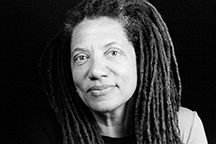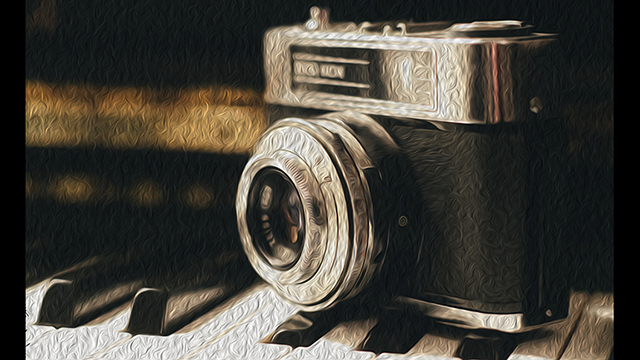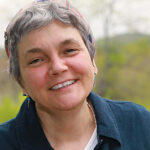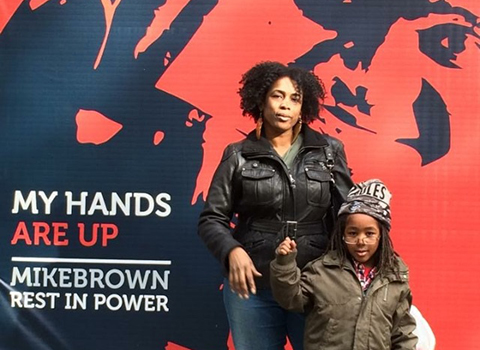In April, Bauhan Publishing published Sparks from the Anvil: the Smith College Poetry Interviews, a collection of interviews with superb contemporary poets by writer and teaching artist Christian McEwen. Throughout the year, Teachers & Writers Magazine has been publishing highlights from this impressive book. Here, McEwen and Nikky Finney have a powerful conversation about Finney’s roots, about music and voice, and also about the potential of poetry to be a power of fierce change in the world.
Nikky Finney has authored four books of poetry: Head Off & Split (2011), a National Book Award Winner; The World Is Round (2003); Rice (1995); and On Wings Made of Gauze (1985). The John H. Bennett, Jr. Chair in Southern Letters and Literature at the University of South Carolina, Finney also authored Heartwood (1997), edited The Ringing Ear: Black Poets Lean South (2007), and co-founded the Affrilachian Poets.
Christian McEwen: Let’s begin with the poem you wrote about your grandmother, Beulah Davenport.
Nikky Finney: Folks always ask how I became a poet, when did all that start? Some of the answers I know, and some I don’t. But my grandmother was a huge influence. She was a farming woman, a woman who grew things with her hands—a woman who could look at the sky and tell you how the day was going to go—deeply rooted in human connectedness to geography and landscape.
I was the oldest granddaughter, and she and I were incredibly close. So many of my own sensibilities—being a human being, being alive, what matters in the world, cycles of life and death—all those things come from my grandmother, who could walk into the woods and tell you what leaf would make a good tea and what leaf to avoid forever. She was a no middle-of-the-road kind of woman, and I wanted to write something that would reflect an incredibly powerful life on this earth—99 years.
CM: That was a big “yes” to her apprenticeship. I felt that in what you wrote about your father—you describe him as just a “regular little fellow,” “an ordinary brown corduroy boy,” and yet he grew up to be the lawyer, “the justice man,” and you grew up to be “the justice man’s daughter.”
NF: It was my grandmother for truth, and my father for justice. My father is a quiet soul and [steady] as a lawyer—a lawyer at war. It’s as if he’s always had a tool belt around his waist—he’s always, in my mind’s eye, hammering away at some door, some illusion, some stereotype. He takes out his little hammer, with his beautiful hands, and tap-taps away at it, and then he might take a swish broom and brush it up without a lot of fanfare, stepping into that new place where those things have now been challenged. That’s how I see my father.
And one of the things he has taught me is that you can knock down barriers in the sweetest way, many times with language, words. That’s what I’m trying to do. He wanted me to go to law school and become a lawyer. That was his first dream. But I think he sees the work I do as a kind of artistic justice, because he understands I’m taking on subject matter that means a lot to me.
CM: What was your relationship to art and poetry as a child? You write about yourself as infant-photographer, “not with any eye but with skin did I see this.”

NF: I was born a stone’s throw from the Atlantic Ocean, in a really tiny town called Conway, South Carolina. And I was born a jaundiced baby. I had to stay in the hospital for a week, which drove my mother crazy. I stayed in that incubator with that round opening, with somebody’s hand coming through to check on me, and that’s how I began to see the world. I love circles. I’m using the image of that circular opening as a kind of lens.
My mother’s brother, my Uncle Billy, came home from Vietnam with trunkloads of photography equipment, and basically abandoned it. My grandmother stored it in the top of the barn, and I discovered it one day, when I was just a girl. There I was at the barn door, looking out over this hundred acres of land—my grandfather’s pride and joy—and I had a telephoto lens, a fisheye lens, an underwater lens, a beautiful Nikon F camera that I had no idea how to use. But I figured it out by messing around with it.
So there I am, a girl of twelve, doing these camera shots of cows’ heads, butterflies, snakes in the grass, the hay barn. How much the visual world means to me, and how quietly I take them in, these deeply sensory images—the smell of the hay, the rain— they’re all coming while I’m standing there, and my eyes, I imagine, clicking the picture.
CM: Was this when you began to think of yourself as a poet?
NF: My writing really began at thirteen, fourteen, fifteen. I was just inundated with the sensory world of South Carolina. I believe that the wandering, contemplative nature I have now was born when I was a girl, from walking across the farm, discovering a snakeskin and picking it up with a stick, climbing a tree, figuring out how I felt about my grandmother yelling at me for having not done something. How I felt about the calf that had been stillborn two days before, or the men who gathered at the farm to slaughter the pigs for the holidays. The sound of the pigs was still in my ear.
So here I was, this tender, tender heart. I was hyper-aware with a deep sensitivity to the sensory world, which is the foundation for my writing.
CM: Looking at your acknowledgements, I find Lucille Clifton, Walter Mosley, Toni Cade Bambara. When did you first encounter their work?
NF: Much later. I was raised at the height of integration in the late 60s, early 70s, and I started out going to Catholic school in Sumter, South Carolina, and my mom and dad said, “We know you like this school, but there’s something bigger going on and we have to be a part of it. So we have to do something we really don’t want to do—move you to the public school system.”
That was very traumatic for me and for my older brother. But we took it in stride. Most of my teachers in those days were white, Southern teachers who gave me the names that I became familiar with going forward—Walt Whitman, Dickinson, Frost. It wasn’t until I left home at eighteen and went to a historically black school in Alabama that I really blossomed into understanding the continuum of writers I was stepping into. I took a course with Dr. Gloria Gayles—she introduced me to Toni Cade Bambara, Toni Morrison, the Harlem Renaissance writers, Countee Cullen, Claude McKay, Gwendolyn Brooks.
So there was a connection made in my teens that made everything explode around me. First, loving words and language, then reading of poets and writers—really good stuff—but then rocketing into, holy cow! African-American culture. Stories about women that I never thought would make it into a book. The permission that that class and that poet-in-her-own-right/scholar/woman gave me, made all the difference in the world.
CM: You asked Lucille Clifton to think of a moment in her life so precious that if she could wear it she would. What might such a moment be for you?
NF: My mother and my father are two amazing people, and they raised us in this womb, this nest of the sweetest love. When I started leaving home my parents would take me to the airport, park the car, walk me in, and they would not leave until the plane was in the air.
I’d say, “Mom, Dad, I can get there, it’s all right.” “No, we’ll take you,” and they’d stand there until I was gone. There’s a ritual of my leaving them. My father empties out his pockets and hands his money to me. My mother does the same, not with money, but with some other object I might need. Oranges, candy, a peppermint.
That’s the picture, the image, that I remember to this day. They park, they go as far as they can go, and then they turn around. It’s the ritual of releasing me to the universe. We don’t do this anymore. Sometimes I wish we’d think more about how we leave each other, and how we might never see each other again. That’s my charm.
CM: As the recipient of so much love, where have you been able to give it on?
NF: I think to the page, but I don’t know that I really like that. I’m not a hermit poet. I have these amazing relationships with people, friends, partners. But I do feel that the purest sense of it, the purest sense of the love I’ve been given does go into the work. That may not be what I wish, but I think it’s true.
CM: You’re giving it to the universe, to history, the future.
NF: There’s also no human personality blocking that love. I think I love fiercely. I love powerfully. But I also have this deep, deep relationship to a pencil and a piece of paper that goes back to my beginnings—my understanding of who I am in the world that never ceases to amaze me. So in that spirit, I’d have to claim my work as the greatest love that has shaped me.
CM: I think of your lines about the black skillet sizzling and “pencilfrying/ sweet Black alphabets/ in an allnight oil.” Are you guided to a poem primarily by its music or by its subject matter?
NF: There’s a lot of music in my head. There was music before there was language. There was music before there was poetry. There’s a play going on in my head right now, music and the visuals that accompany the music. There’s Nina Simone and a piano in Paris, 1963, and the writing of To Be Young, Gifted and Black; there’s the sound of James Brown singing “To Be Black and Proud,” and the visual memory of his feet skating across The Ed Sullivan Show on black and white TV. My brow must have been gnarled in amazement, because who had ever seen anybody’s feet do that? There’s this music that’s coupled with the visuals—Billie Holiday, the arresting intonations of Sarah Vaughn. All of the memories go into the sound I hope to make as a poet. I don’t ever want to lose my connection to that.
I learned to adore a great microphone, because it doesn’t destroy the beauty of the human voice. I was raised up in a world where I paid close attention to sound and elocution.
CM: You spoke in an earlier interview of the power of the human voice, how it can make people want to jump and shout.
NF: I listened for a very long time as a girl. I was incredibly quiet. My mother used to check in on me, “Are you OK?” I didn’t come out of a quiet family or a quiet time. I had noisy brothers. The 60s were incredibly violent, loud, and noisy. My grandmother would roll me out into the garden—hot, mosquitoes, sun, flies—and she said, “I’ve never seen a child just sit there and look around like that, notice the storm clouds coming.” That was my sensory perception growing bigger and getting fed. Later, when I was in church, I learned to adore a great microphone, because it doesn’t destroy the beauty of the human voice. I was raised up in a world where I paid close attention to sound and elocution.
CM: At what point did you cease to be this silent, attentive child and become a voice in your own right?
NF: It had to be in my twenties. I had to decide whether to be this quiet, nice girl who had been writing in her journal books since she was thirteen—I still write in them—or step into the shoes that had been made for me.
It was a conscious decision. I remember it clearly. I was writing, but writing very privately. Not sharing them. Two or three absolute things happened that changed the direction of my life. Meeting Toni Cade Bambara when I was 21—she began to host a writing workshop in her house the first Sunday of every month. Twelve noon ’til sometimes twelve at night. Whoever brought work, we stayed with it until it was done.
I was in that workshop for two years, and it changed my life. I was always a “pretty” writer. I could write pretty words and I knew how to do that. People would say, “Wow, you can do that.” Toni Cade Bambara was the first person to say to me, “OK, Nikky, you can write a pretty poem. So what? What’s the plan? What are you going to do next?”
I had to really think about the breath behind the words, what the words would do out in the world and what I wanted them to do. That was a huge moment for me. I had to talk about how I wanted to communicate something—not just move the alphabet around. I wanted to tell a story. I wanted that story to matter. I wanted that story to start a conversation between people who didn’t usually talk to each other. I grew up a girl who read things that mattered, that changed my life when I read them. Words can change our life. Stories can make you travel around the world. They can bring opposing forces into the same room to have a conversation. I still believe language has that absolute power. And I’ve believed that all my life.
The Black Arts Movement was huge in the States. There were people standing up and saying, “We have to be responsible for what we say. We have to say very courageous, hard things,” and so they were models for me. But I wanted to say the hard things in a tender way.
So I’m with Toni Cade Bambara and we’re walking in Atlanta, and a man approaches. He looks like a bus driver and he says, “Aren’t you that writer lady?” I think, oh, he’s gonna ask her for an autograph or a book, and she goes, “Yeah, I’m that writer.” She was well known around Atlanta. And he says, “Well, I want to buy a house, but I can’t figure out this contract.” And he pulls out the bank forms and says, “Can you help me?” And I’m stunned, I’m startled. I’m standing there, going, what does he mean asking her about something that’s totally disconnected from what she does? And she says, “Be at my house Saturday at four o’clock. What’s your name?” He says, “Roy,” and she says, “Come by the house, Roy, and I’ll help you.”
At that moment, what it meant to be a writer was completely transformed for me. You don’t sit alone at your desk stowed away from life; you don’t become a hermit; you [don’t] act like nobody understands you, like you don’t care. No! She taught me in that moment that there was a human being who worked hard, who’d saved enough money to buy a house—the American Dream—and the one thing keeping him from that was that he couldn’t write. She said, “I will step into this scenario because I am a writer.” It shaped everything going forward for me. She was an amazing woman—a writer, an activist, a truth-teller. He got the house.
Stories can make you travel around the world. They can bring opposing forces into the same room to have a conversation.
CM: This connects to your own passion for justice as manifested in poems like “The Devil is Beating his Wife,” “The Butt of the Joke,” and “The Girlfriend’s Train.”
NF: I began to understand that I had to start educating myself. You have to do this. You have to find where your place is, and when you find it, you can’t be afraid of what you find. You can run away from it for a little while, but then you have to embrace it, dance with it, feed it, nurture it, give it sunshine and water, because as far as I know, this is my one chance. It’s gonna be lonely sometimes. I’m gonna be isolated from the community, the people I love, sometimes, but this is the work I have to do.
If I have to fight for the rest of my life putting language together that represents my right to love and to live and be, then I will.
CM: I’m reminded of the poem, “Sex,” where the narrator, a lesbian, is asked, “What do you know about it anyway?” by her beloved mother.
NF: Yes. That poem…. I just had to figure out how to write about it. You used the word “beloved” and that is so true. So how do I write this story giving honor to my love for my mother, and also honoring the truth of my life? It was the most difficult balancing act I’ve done as a writer. But my mother really did say that to me. The belief that a woman loving a woman is “less than” the love that a woman and a man share, that nothing I do can equal what my brothers do in their marriages—it set me on my head.
I knew I had to write about it, because not to write about it would have been a lie, and I teach my students to tell the truth. I had to do what I so often talk about.
I remember reading this essay by Audre Lorde called “Uses of the Erotic.” It’s the most stunning essay I’ve ever read about the power of being a lesbian in the world. It gave me such permission. It was so freeing. It was so true to my own life that I wanted to tape every page to my body, and never take it off.
But I deal with and handle tough subjects, I hope, quietly but powerfully. I still don’t stand on the box on the corner of the street. I still want to go home with my pencil and sharpen it, razor-sharp, and come back fighting on the page with things that are unfair, with anybody who tries to say that my love is not equal to somebody else’s love. If I have to fight for the rest of my life putting language together that represents my right to love and to live and be, then I will.
—June 2, 2009
Northampton, Massachusetts
Editor’s Note: This interview has been edited and condensed for space considerations and clarity.
In this video from The State Newspaper, Nikky Finney responds to the departure of the Conferderate flag from the South Carolina State House grounds. Featured on Def Jam Poetry in 2013, Finney gives a fierce reading of her poem “Girlfriend’s Train.” And here, John Lithgow and Elizabeth Alexander award Finney the National Book Award for Head Off & Split.
Christian McEwen is a freelance writer and workshop leader originally from the U.K. She is the author of several books, including World Enough & Time: On Creativity and Slowing Down, now in its eighth printing. She edited Jo’s Girls: Tomboy Tales of High Adventure; Sparks from the Anvil: the Smith College Poetry Interviews; and, with Mark Statman, The Alphabet of the Trees: A Guide to Nature Writing. Christian has enjoyed residencies at Yaddo, MacDowell, Mesa Refuge, and the Virginia Center for the Creative Arts, and has received a fellowship in playwriting from the Massachusetts Cultural Council. Her new book, In Praise of Listening, will be published in October.




